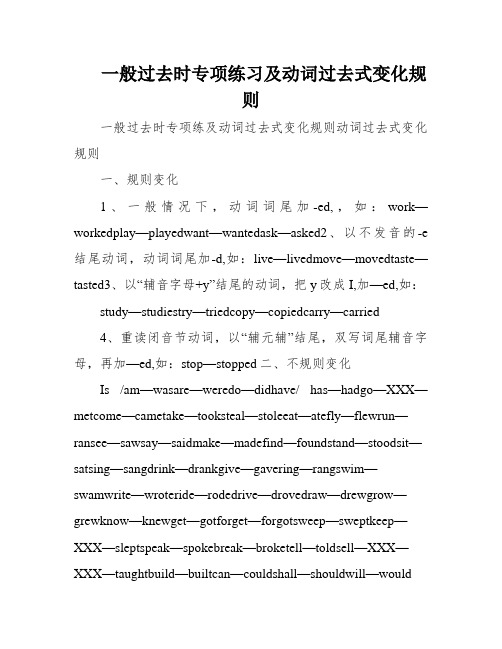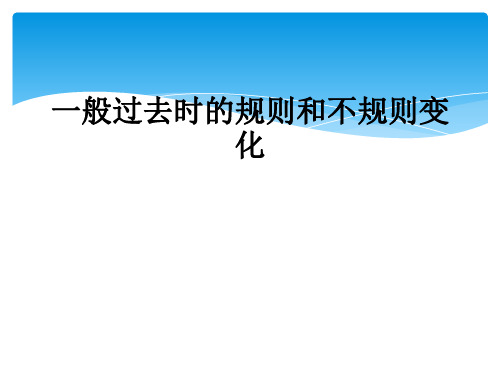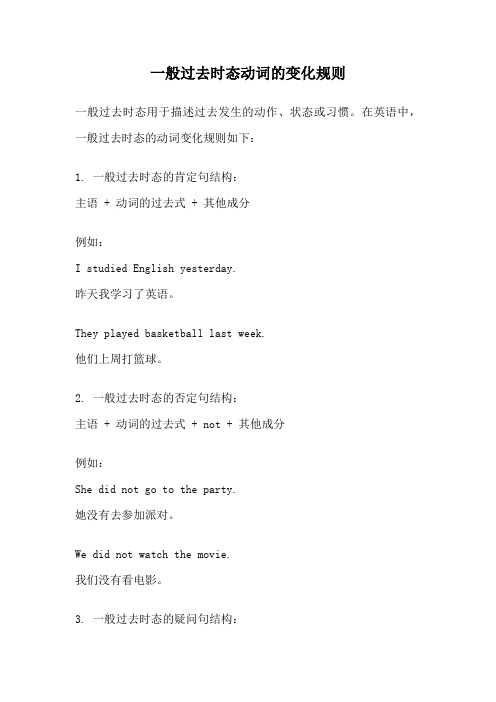一般过去时中动词的变化规则
一般过去时特殊变化总结

一般过去时特殊变化总结1.一般过去时表示过去某个时间发生的动作或存在的状态,常和表示过去的时间状语连用。
一般过去时也表示过去经常或反复发生的动作。
2.Be动词在一般过去时中的变化:⑴am 和is在一般过去时中变为was。
(was not=wasn’t)⑵are在一般过去时中变为were。
(werenot=weren’t)⑶带有was或were的句子,其否定、疑问的变化和is, am, are一样,即否定句在was 或were后加not,一般疑问句把was或were调到句首。
3.句中没有be动词的一般过去时的句子否定句:didn’t +动词原形,如:Jim didn’t go home yesterday.一般疑问句:在句首加did,句子中的动词过去式变回原形。
如:Did Jim go home yesterday?特殊疑问句:⑴疑问词+did+主语+动词原形? 如: What did Jim do yesterday?⑵疑问词当主语时:疑问词+动词过去式? 如:Who went to home yesterday?4、动词过去式变化规则:1)一般在动词末尾加-ed,如:pull-pulled, cook-cooked2)结尾是e加d如: pnone- pnoned 打电话,like -liked喜欢,live-lived居住度过,tie-tied扎上,系上 love-loved爱,喜爱,wake-waked醒来 close-closed结束关闭exercise-exerised运用练习,dance-danced跳舞,scare-scared惊恐、害怕,taste-tasted 品尝体验bounce-bounced弹起跳起practise-practised实践开业,raise-raised升起举起donate-donated捐赠; 捐献3)末尾只有一个元音字母和一个辅音字母的重读闭音节,应双写末尾的辅音字母,再加-ed,如:stop--stopped 停止hop-hopped跳跃skip-skipped跳过Plan--planned 安排、设计fit--fitted 适合;安装drop--dropped放弃;停止refer-referred谈及;咨询regret-regretted后悔;惋惜 ban-banned禁止剥夺权利4)以“辅音字母+y”结尾的,变y为i,再加-ed,如:try-tried尝试;努力 cry.-cried 哭;喊 carry-carried 拿搬worry-worried 担心;烦恼study-studied学习,研究hurry-hurried赶紧copy-copied 复制;抄写 embody-embodied 包含 justify-justified证明...是正当的empty-emptied倒空 marry-married结婚5)不规则动词过去式①与原型相同cut-cut 切 hurt-hurt伤害、使疼痛 put-put放 read- read读 must-must必须hit-hit 击打 shut-shut关闭 let-let让 set-set设置 cost-cost代价;花费Beat-beat 打、敲、打败 spread-spread传播、打开②采用不同的词根变化③变词尾的d为tS end-s ent 送邮寄 sp end-sp ent花(钱);花费(时间) l end-l ent借借给;给予b end-b ent弯曲;屈身 buil d-buil t 建筑建造;增加④末尾加一个辅音字母hear- heard听 learn-learnt学习 burn-burnt燃烧烧坏晒伤mean-meant打算导致意味着 dream-dreamt 梦见梦想考虑⑤改变一个辅音字母pass-past通过经过 make-made做⑥变ay为aids ay -s aid讲;说明 p ay -p aid付(款),支付l ay -l aid 放置下(蛋)产(卵)(注意:play-played)⑦去掉一个元音字母meet-met见到 feed-fed 喂 speed-sped 加速、移动choose-chose选择挑选 shoot-shot射击发射lead-led 带领带路 hide-hid隐藏遮住⑧改变一个元音字母改变i为o的,如:Write- wrote写 drive-drove驾驶 ride-rode骑win-won 获胜赢rise-rose升起站立增加 shine-shone 闪耀擦亮改变i为a的,如:Swim-swam游泳 begin-began开始;始于 sing-sang唱歌ring -rang响 sit-sat坐 drink-drank喝、改变 give-gave给予赠予改变i为u的,如:dig-dug 掘凿挖 swing-swung摆动摇摆stick-stuck粘贴刺插钉住改变o为a的,如:Come-came来 be come-be came变成改变o为e的,如:know-knew知道 grow-grew 种植;生长;培养hold-held 抓住持有 blow-blew 刮吹炸毁 throw-threw 掷扔板动改变e为o的,如:get-got得到for get-for got忘记改变a为e的,如:draw-drew画 fall--fell落下摔倒倒塌改变a为u的,如:hang-hung 悬挂垂下改变a为o的,如:wake-woke 醒来改变u为a的,如: Run-ran跑⑨改一个元音为辅音字母see-saw看见 lose-lost丢失⑩字母组合改变T ake-t ook拿到、带;拍摄 mistake-mistook误解口误 sh ake-sh ook摇动抖动stand-stood 站立忍受 understand-understood理解解释领会wear-wore穿戴 bear-bore 承受承担具有speak- spoke讲话 break-broke 破裂碎损坏Leave-l eft离开 sleep - slept睡觉 keep-kept 保持重复留下 sweep-swept 打扫扫feel-f elt感觉Smell-slelt(smelled)气味闻到 spell-spelt 拼写招致⑾系动词助动词情态动词等am,is-was是 are--were是 do-did 做 have(has)-had有can -c ould能 may-might 可能 will-w ould意愿 Shall-sh ould将将要应该⑿其他特殊变化的动词go- went去 eat-ate 吃 Steal-stole 偷窃抢(戏)断(球)lie-lay 躺平卧位于 Find-found找寻发现 fly -flew 飞light-lit 照亮燃烧点燃句中be动词和动词一般情况下只能有一种而且也必须有一种。
一般过去时专项练习及动词过去式变化规则

一般过去时专项练习及动词过去式变化规则动词过去式变化规则一、规则变化1、一般情况下,动词词尾加-ed,,如:work—worked play—played want—wanted ask—asked2、以不发音的-e结尾动词,动词词尾加-d,如:live—lived move—moved taste—tasted3、以“辅音字母+y”结尾的动词,把y改成I,加—ed, 如:study—studies try—tried copy—copied carry—carried4、重读闭音节动词,以“辅元辅”结尾,双写词尾辅音字母,再加—ed, 如:stop—stopped二、不规则变化Is /am—was are—were do—did have/ has—had go—went meet—met come—came take—took steal—stole eat—ate fly—flew run—ran see—saw say—said make—made find—found stand—stood sit—sat sing—sang drink—drank give—gave ring—rang swim—swam write—wrote ride—rode drive—drove draw—drew grow—grew know—knew get—got forget—forgot sweep—swept keep—kept sleep—slept speak—spoke break—broke tell—told sell—sold buy—bought think—thought catch—caught teach—taught build—built can—could shall—should will—would过去式与动词原形一样:let—let must—must put—put read—read三、动词过去式构成读音1、清辅音后读清辅音[t] (清读清)如:jump like2、浊辅音后读浊辅音[d] (浊读浊)如:listen pull3、元音后面读浊辅音[d] (元音后面读浊音)如:water play4、[t][d]后面读[id] want need一般过去时专项练习一、写出下列动词的过去式1.am/is ______2.do _______3.go ________4.have _______5.isn’t _________6. ar en’t ________7.spend________8.cook_______9.read________10.clean_______ 11.live _______ 12.study_________三、用括号内所给词的适当形式填空1. We _________ (enjoy) ourselves at the party last night.2.Jack ____________ (study) for the English test last Sunday.3._______ you ______ (go) to the Great Wall last year?4. What day _______ (be) it yesterday?5.The old man _______(be)ill and went to see a doctor.6.We ________ (have) a party last night.7.We __________ (visit) the museum and went home.8.— How _______ (be) the students? — They were very friendly.9.He often _______ (have) supper at home. Today he ______ (have) supper at school.10.— ______ he _______ (have) lunch at nine? —No, he didn’t.11.They _________(buy) a guitar yesterday.五、选择填空( ) 1. Lee ____ his mobile phone at home. A. leave B. leaves C. leaved D. left( ) 2. ___ he ___a good rest? No, he didn’t. A. Do, had B. Did, have C. Did, had D. Was, had ( ) 3. As soon as he __, he _ to his family.A. arrived, writesB. arrived, writtenC. arrived, wroteD. arriveds, write( ) 4. Mr. Black was late because he _______ his way. A. losted B. lose C. loses D. lost ( ) 5. When _________ Lee ________ school this morning?A. did, got toB. did, get toC. did, getD. did, got( ) 6. Will you please say it again? I _ quite __you.A. didn’t, hearB. don’t, heardC. didn’t, heardD. don’t, hear( ) 7. _you __at six o’clock yesterday? A. Do ,ge t up B. Did, get up C. Do, got up D. Did, got up ( ) 8.What did you see ____? A. now B. every day C. these days D. just now( ) 9.He went into the room and ____ the door. A. lock B. locking C. locks D. locked ( ) 10. What __ you __last week? I bought a bag.A. did ,buy B. did , bought C. do, buy D. do, bought ( ) 11. —__he __his lunch? — Yes, he did. A. Does ,has B. Does, have C. Did, have D. Did, had ( )12.—Did the thieves _____ into the car? —No, they______.A. fell, didn’tB. fall(落下), didC. jump(跳), didn’tD. jump, did( ) 13. -When did May come back from Hong Kong? -She __ from Hong Kong last Friday.A. come backB. comes backC. returned backD. came back( ) 14. ____ she _____ this dictionary in the bookshop nearby last week?A. Did, buyB. Does, buyC. Did, boughtD. Does, buys( ) 15. He ____ to the station this morning and was______ for the train.A. hurry, in timeB. hurries, on timeC. hurried, in timeD. hurried, at time( ) 16. Where _____ Uncle Sun yesterday? A. was B. were C. did D. does( ) 17. —Have you seen him today? —Yes, I ____ him this morning.A. seeingB. seeC. seesD. saw( ) 18. He ____worried when he heard the news. A. is B. was C. does D. did( ) 19. There ___ a telephone call for my brother Steven yesterday? A. is B. are C. was D. were ( ) 20. Liu Fengwei _____ three yuan for the lost library book.A. paidB. payC. spentD. lost( ) 21. He __ in this school in 1958. A. taught B. teach C. teaches D. teaching( ) 22. They __ tired so they stopped __a rest.A. are, haveB. were, haveC. were, to haveD. are, having( ) 23. Yesterday I _____ in bed all day because I had a fever. A. lay B. lie C. laid D. lied ( ) 24. It was raining hard when he ____ home. A. got B. get C. gets D. was getting( ) 25. She said her brother ____ in Beijing. He ______ to Japan on business last week.A. wasn’t, wentB. hasn’t, wentC. wasn’t, goD. isn’t, went七、用所给动词的适当形式填空1.Tom and Mary ___________ (come) to China last month.2.Mary __________ (read) English yesterday morning.3.There _________ (be) no one here a moment ago.4.I ___________ (call) Mike this morning.5.I listened but ___________ (hear) nothing.6.Tom ___________ (begin) to learn Chinese last year.st week we _________ (pick) many apples on the farm.8.My mother ________________ (not do) housework yesterday.9.She watches TV every evening. But she _______________ (not watch) TV last night.10.________ your father ________ ( go ) to work every day last year?st year the teacher ___________ (tell) us that the earth moves around the sun.12.There ____________ a telephone call for you just now. (be)13.There __________ not enough people to pick apples that day. ( be)14.There _____________ any hospitals (医院) in my hometown (家乡) in 1940. ( be not)15.There ____________ enough milk at home last week, wasn’t there?16.Eli ____________ to Japan last week. ( move)17. –When _______ you _________ (come) to China? - Last year.18.Did she ________ (have) supper at home?19.Jack ____________ (not clean) the room just now.20._________ (be) it cold in your city yesterday?21.How many people ________ (be) there in your class last term?22.It ________ (be) hot yesterday and most children _______ (be) outside.23. There ________ (be) a football match on TV yesterday evening, but I _________ (have) no time to watch it.24. He ate some bread and _________ (drink) some milk.25. ________ he __________ (finish) his homework last night?26. I__________(be) tired yesterday.27. What _________ you ___________ (do) last night?28. My grandfather _________ (leave) Hong Kong for New York in 1998.29. What _______ he ________ (do) yesterday?30. Last week I _______ (buy) a new bike.31. He ________ (be) here just now.32. He __________ (not find ) his key last night.33. My father __________ (drink) a lot of wine yesterday.。
一般过去时专项练习及动词过去式变化规则

一般过去时专项练习及动词过去式变化规则一般过去时专项练及动词过去式变化规则动词过去式变化规则一、规则变化1、一般情况下,动词词尾加-ed,,如:work—workedplay—playedwant—wantedask—asked2、以不发音的-e 结尾动词,动词词尾加-d,如:live—livedmove—movedtaste—tasted3、以“辅音字母+y”结尾的动词,把y改成I,加—ed,如:study—studiestry—triedcopy—copiedcarry—carried4、重读闭音节动词,以“辅元辅”结尾,双写词尾辅音字母,再加—ed,如:stop—stopped二、不规则变化Is /am—wasare—weredo—didhave/ has—hadgo—XXX—metcome—cametake—tooksteal—stoleeat—atefly—flewrun—ransee—sawsay—saidmake—madefind—foundstand—stoodsit—satsing—sangdrink—drankgive—gavering—rangswim—swamwrite—wroteride—rodedrive—drovedraw—drewgrow—grewknow—knewget—gotforget—forgotsweep—sweptkeep—XXX—sleptspeak—spokebreak—broketell—toldsell—XXX—XXX—taughtbuild—builtcan—couldshall—shouldwill—would曩昔式与动词真相一样:let—letmust—mustput—putread—read三、动词过去式构成读音1、清辅音后读清辅音[t](清读清)如:XXX2、浊辅音后读浊辅音[d](浊读浊)如:listenpull3、元音背面读浊子音[d](元音背面读浊音)如:waterplay4、[t][d]后面读[id] wantneed普通曩昔时专项操演一、写出下列动词的过去式1.am/is______2.do_______3.go________4.have_______5.isn’t_________6.aren’t________7.spend_______ _8.cook_______9.read________10.clean_______ 11.live _______ 12.study_________3、用括号内所给词的恰当方式填空1. We _________ (enjoy) ourselves at the party last night.2.XXX ____________ (study) for the English test last Sunday.3._______ you ______ (go) to the Great Wall last year?4. What day _______ (be) it yesterday?5.The old man _______(be)ill and went to see a doctor.6.We ________ (have) a party last night.7.We __________ (visit) the museum and went home.8.—How _______ (be) the students?—They were very friendly.9.He often _______ (have) supper at home. Today he ______ (have) XXX.10.—______ he _______ (have) lunch at nine?—No, he didn’t.11.They _________(buy) a guitar yesterday.5、挑选填空() 1. Lee ____ his mobile phone at home.A. XXX() 2. ___ he ___agood rest? No, he didn’t.A. Do, hadB. D id, haveC. Did, had D. Was, had() 3. As soon as he __, he _to his family.A. arrived, writesB. arrived, writtenC. arrived, wroteD. arriveds, write() 4. Mr. Black was late because he _______ XXX()5. When _________ Lee ________ school this morning?A. did, got toB. did, get toC. did, getD. did, got() 6. Will you please say it again? I _quite __you.A. XXX’t, XXX’t, XXX’t, XXX’t, hear() 7. _you __at six o’clock yesterday? A. Do ,get upB. Did, get upC. Do, got upD. Did, got up() 8.What did you see ____? A. nowB. every dayC. these daysD. just now() 9.He went into theroom and ____ XXX() 10. What __ you __last week? I bought a bag.A. did ,buy B. did , bought C. do, buy D. do, bought() 11.—__he __his lunch?—Yes, he did. A. Does ,hasB. Does, haveC. Did, haveD. Did, had()12.—Did the thieves _____ into the car?—No, they______.A. fell, XXX’tB.fall(落下), XXX(跳), XXX, did() 13. -When did May come back from Hong Kong?-She __ from Hong Kong last Friday.A. come XXX() 14. ____ she _____ XXX?A. Did, buyB. Does, buyC. Did, boughtD. Does, XXX() 15. He ____ to the station this morning and was______ for the train.A. hurry, XXX hurries, XXX hurried, in timeD. hurried, at time() 16. Where _____ XXX() 17.—Have you seen him today?—Yes, I ____ him this morning.A. XXX() 18. He ____worried when he heard the news. A. isB. wasC. doesD. did() 19. There ___ a telephone call for my brother Steven yesterday?A. isB. are C. was D. were() 20. Liu Fengwei _____ three yuan for the lost library book.A. XXX() 21. He __ in this school in 1958.A. XXX() 22. They __ tired so they stopped __a rest.A. are, haveB. were, haveC. were, to haveD. are, having() 23. XXX I _____ in bed all day because I had a XXX() 24. It was raining hard when he ____ home.A. gotB. getC. getsD. was getting() 25. She said her brother ____ in Beijing. He ______ to Japan on business last week.A. wasn’t, XXX’t, XXX’t, goD. isn’t, went七、用所给动词的适当形式填空1.Tom and Mary ___________ (come) to China last month.2.Mary __________ (read) XXX.3.There _________ (be) no one here a moment ago.4.I ___________ (call) Mike this morning.5.I listened but ___________ (hear) nothing.6.Tom ___________ (begin) to learn Chinese last year.。
一般过去时的规则和不规则变化

如:
study —— studied cry —— cried worry —— worried
carry —— carried
4.重读闭音节结尾的动词末尾只有一个 辅音字母,需双写这个辅音再加-ed.
stop ___ stopped shop ___ stopped
规则动词过去式记忆口诀
过去式构成有规律 一般词尾加-ed 如词尾有个e,直接加-d就可 辅音字母y结尾,变y为i加-ed 辅音重闭结尾,双写之后加-ed
一般过去时的规则和不规则变 化
规则动词
1.一般的动词:直接加-ed
如:watch——watched help——helped work——worked
2.以字母e结尾的单词:加-d
如:love——loved live——lived arrive——arrived
3.以辅音字母y结尾的动词:变y为i再加-ed
(6)ow/aw变成ew know——knew grow——grew
(7)以d结尾的单词,把d改为t build——built send——sent spend——sp动词原形和过去式一样
let——let read——read cost——cost
put——put cut——cut hurt——hurt
(2)遇见i改为a
swim sing begin sit give drink
swam sang began sat gave drank
(3)过去式以ought和aught结尾的单词
bring buy think catch teach
brought bought thought caught taught
(4)中间去e末尾加t
一般过去时态动词的变化规则

一般过去时态动词的变化规则一般过去时态用于描述过去发生的动作、状态或习惯。
在英语中,一般过去时态的动词变化规则如下:1. 一般过去时态的肯定句结构:主语 + 动词的过去式 + 其他成分例如:I studied English yesterday.昨天我学习了英语。
They played basketball last week.他们上周打篮球。
2. 一般过去时态的否定句结构:主语 + 动词的过去式 + not + 其他成分例如:She did not go to the party.她没有去参加派对。
We did not watch the movie.我们没有看电影。
3. 一般过去时态的疑问句结构:Did + 主语 + 动词原形 + 其他成分?例如:Did you finish your homework?你完成作业了吗?Did they visit their grandparents?他们去拜访祖父母了吗?4. 动词的过去式变化规则:一般来说,动词的过去式可以通过在动词原形后面加上-ed来构成。
但是也有一些不规则动词需要记忆其过去式形式。
例如:work - worked工作 - 工作过play - played玩 - 玩过study - studied学习 - 学习过go - went去 - 去过5. 一般过去时态的时间状语:一般过去时态常常和表示过去的时间状语词连用,以明确动作发生的时间。
例如:yesterday昨天last week上周two hours ago两小时前in 1990在1990年总结起来,一般过去时态的动词变化规则包括了动词的过去式构成以及肯定句、否定句和疑问句的结构。
在使用一般过去时态时,我们需要根据句子结构和上下文来确定动词的过去式形式,同时注意使用适当的时间状语词来明确动作发生的时间。
通过掌握这些规则,我们可以更准确地描述过去发生的事情,使我们的句子更加流利和地道。
一般过去时变化规则

一般过去时变化规则(1) 一般在动词后加-ed。
如:play—played, offer—offered, weigh—weighed,Destroy— destroyed, sign—signed.(2) 在以字母e结尾的动词后,只加-d。
如:like—liked, provide—provided, hate — hated, date—dated。
(3) 在以“辅音字母+y”结尾的动词后,则改y为i,再加ed。
如:supply—supplied, fly—flied, study— studied.(4) 在以单短元音的重读闭音节结尾且末尾只有一个辅音字母的动词后,双写最后一个辅音字母,再加-ed。
如:plan—planned, refer—referred, regret—regretted, ban—banned.★重读闭音节三要素:(1)一个元音字母后跟一个或几个辅音字母(2)以一个辅音音素结尾;(3)元音字母发短元音。
★长元音:[i:][ə:][a:][ɔ:][u:]短元音:[e] [i] [ʌ] [æ][ə][ɔ][u]常用不规则动词分类表⒈ A---A---A型(现在式、过去式、过去分词同形)cost cost cost 花费 cut cut cut 割,切 hit hit hit 打let let let 让 put put put 放下 read read read 读hurt hurt hurt 伤⒉ A---A---B型(现在式和过去式同形)beat beat beaten 打⒊ A---B---A型(现在式和过去分词同形)come came come 来 become became become 变run ran run 跑⒋ A ---B ---B型⑴在动词原形后加一个辅音字母d或t构成过去式或过去分词。
burn burnt burnt 燃烧 learn learned/learnt learned/learnt 学习mean meant meant 意思 hear heard heard 听见⑵把动词原形的最后一个辅音字母“d”改为“t”构成过去式或过去分词。
动词的一般过去时变化规律

一般过去式的变化规则:1、一般在动词末尾加-ed;2、结尾是e加d;3、末尾只有一个元音字母和一个辅音字母的重读闭音节,应双写末尾的辅音字母,再加-ed,;4、以“辅音字母+y”结尾的,变y为i,再加-ed;5、不规则动词过去式:am,is-was are-were do-did see-saw say-said give-gave get-got go-went come-came have-had eat-ate;3、末尾只有一个元音字母和一个辅音字母的重读闭音节,应双写末尾的辅音字母,再加-ed,;4、以“辅音字母+y”结尾的,变y为i,再加-ed;5、不规则动词过去式:am,is-was are-were do-did see-saw say-said give-gave get-got go-went come-came have-had eat-ate;扩展一般过去时表示过去某个时间里发生的动作或状态;过去习惯性、经常性的动作、行为。
在英语语法中,“时“指动作发生的时间,”态“指动作的样子和状态。
一般过去时句法结构:1、肯定形式:主语+动词过去式+其他2、否定形式主语+didn't +谓语动词原形+其他①was/were+not;②在行为动词前加didn't,同时还原行为动词3、一般疑问句①Did+主语+谓语动词原形+其它?②Was/Were+主语+表语?4、一般过去时的特殊疑问句疑问词+ did+主语+动词原形+其他?疑问词+was/were+物主代词/...'s+sth.?5、被动语态主语+ was / were + 动词的过去分词。
英语语法解析 一般过去时的构成及用法

英语语法解析一般过去时的构成及用法1.一般过去时的构成一般过去时由动词的过去式构成。
动词过去式的变化规则有:规则动词的变化:①一般情况下在动词后直接加ed。
look—looked clean—cleaned②以e结尾的动词后直接加d。
like—liked dance—danced③以辅音字母+y结尾的动词,变y 为i,再加ed。
study—studied worry—worried特别提示:以元音字母+y结尾的动词,不需要变化,直接加ed。
destroy—destroyed play—played stay--stayed④以重读闭音节或/r/音节结尾,并且以一个辅音字母结尾,双写最后一个字母,再加ed。
stop—stopped permit—permitted admit—admitted prefer—preferred refer—referred occur—occurred不规则动词的变化:be动词的变化:is/am—was;are—weredo/does—did;has/have—had ;see—saw;break—broke等等。
不规则动词的变化形式需根据不规则动词表进行记忆。
2.一般过去时的用法①表示在过去某一时间段内习惯性的或经常性的动作。
常用的时间状语有:often,seldom,usually等。
He often played by the riverside when he was young.他小的时常在河边玩耍。
②表示在过去某个时间所发生的动作或状态,在过去已经结束,与现在没有关系。
常用的时间状语有:last week,in 1981,yesterday,ten years ago等。
He took a day off last week.他上周请了一天假。
He was elected president in 1980.他于1980年当选总统。
③在时间状语从句,条件状语从句中用过去式表示过去将来。
- 1、下载文档前请自行甄别文档内容的完整性,平台不提供额外的编辑、内容补充、找答案等附加服务。
- 2、"仅部分预览"的文档,不可在线预览部分如存在完整性等问题,可反馈申请退款(可完整预览的文档不适用该条件!)。
- 3、如文档侵犯您的权益,请联系客服反馈,我们会尽快为您处理(人工客服工作时间:9:00-18:30)。
move --- move taste--- taste
d
d
规则二
During the summer holiday, I lived in Beijing.
以不发音的字母--e结尾的 动词,词尾加--d.
规则三
study cry carry(运载) worry(担心)
stuபைடு நூலகம்ied cried carried(运载) worried
规则三
以辅音字母+y结尾的动词, 把y变成i,再加-ed
本内容仅供参考,如需使用,请根据自己实际情况更改后使用!
放映结束 感谢各位批评指导!
让我们共同进步
I enjoyed my holiday.
play---played visit---visited enjoy--enjoyed
stay--- staye pick--- picked watch--- watched d
↓
一般情况下,动词词尾 加--ed.
规则二
During the summer holiday, I lived in Beijing.
一般过去时 动词的变化规则
什么是一般过去时?
一般过去时表示过去某个时间里发生的动作或状态。
所有时态都是 通过动词变化
来表现的。
规则一
During the summer holiday, I played ball games with my friends.
I also visited my grandparents.
